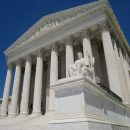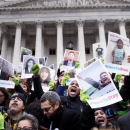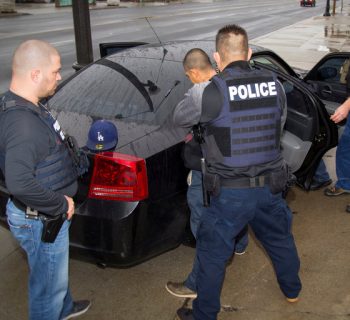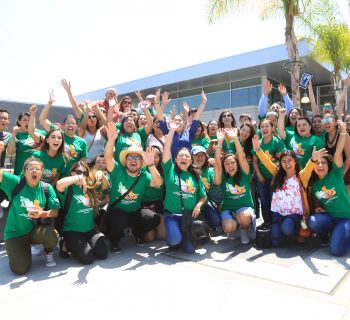By: Matthew Casey, Jaye McAuliffe, Steve Goldstein, Lauren Gilger ~ Fronteras ~ November 12, 2019
Karina Ruiz is an activist. She studied biochemistry in college, and does real estate part-time. Ruiz was born in Mexico. Ruiz can work and drive legally in the United States because she’s in the Deferred Action for Childhood Arrivals program (DACA).
“And the Supreme Court has to go beyond the technicalities and do the right thing to protect people like myself,” she said.
Ruiz recently shepherded like-minded marchers through one of Phoenix’s main arteries. The next morning she hopped on a flight to Washington, D.C. Ruiz said she’ll be inside the U.S. Supreme Court when the final round of the fight for DACA starts Tuesday morning.
It’s taken a little more than two years for DACA to rise through the judiciary system. But the questions before the high-court have little to do with whether nearly 25,000 Arizonans have earned a shot at citizenship.
“If [the Justices] want to be on the right (side) of history, they have to go beyond just the procedure. But really look at the whole issue and look at our lives that are at stake,” she said.
Ruiz is executive director of the Arizona Dream Act Coalition. She’s been a KJZZ source for years. But it’s been almost two decades since the mother of three U.S. citizens first heard Congress might give her, and millions of other so-called DREAMers, a shot at citizenship. It's a significant step beyond DACA, and something Congress has yet to approve.
“I became a grandma waiting for the DREAM Act,” she said.
In the meantime, Ruiz is grateful for the protection against deportation that DACA gives her, and roughly 661,000 others. So many immigrants get no help, she said. Life has been a roller coaster for the last couple years. Ruiz wakes up every day with a question.

“What is Trump going to Tweet that’s going to really affect my life, and put me at risk of deportation, and at risk of being separated from my family?”
In 2017, a group of state attorneys general threatened a lawsuit to force President Donald Trump’s hand on a campaign promise he’d softened on since taking office.
DACA recipients watched in Phoenix as then-Attorney General Jeff Sessions said DACA — created by executive order under President Barack Obama — would soon be gone.
“Such an open-ended circumvention of immigration laws was an unconstitutional exercise of authority by the executive branch,” he said.
Lawsuits quickly followed. Then came rulings that kept DACA going during the legal fight. A final win for DACA would mostly likely result from the Supreme Court determining that the administration chose to end the program on a whim, and for fickle reasons, said attorney Ray Ybarra Maldonado.
“In administrative law, you have to give a reason for why you are terminating a program or making the change,” he said.
The high-court may also end DACA by concluding it doesn’t have power over the administration’s decision, Ybarra Maldonado said.
“If he we see a loss here, I think we’re going to see it on a technical ground. The Supreme Court is going to technically punt the issue of the morality,” he said.

This means neither potential outcome leans heavily on whether DACA recipients have earned a right to stay. Polls have repeatedly shown that most Americans think they have.
If a majority of five Supreme Court justices keeps DACA alive, it’s not a permanent fix to a decades old problem.
“What we’re talking about here is continuing a band aid program. Not about a solution whatsoever, Ybarra Maldonado said.
Karina Ruiz, leader of the Arizona Dream Act Coalition, stopped the immigrant rights march at Sen. Martha McSally’s office on Camelback Road. Then she introduced DACA recipient Carlos Yanez as the first speaker
Yanez is a college student. KJZZ first interviewed him on the day DACA was canceled. Back then, Yanez said no DACA meant fight or flight. That fear is still there, he said. But what Yanez told the crowd showed that activism has become a way for him to confront it.
“I am more than just my permit. This is my home. My family is here. My friends are here. The people I love are here. So whatever happens at the Supreme Court, I will not leave,” he said.
Since DACA was canceled and resuscitated, Yanez said he’s done acts of civil disobedience, heard people’s cries, and saw them arrested. The experience was why he changed career plans from medicine to law.
“And I just felt if I’m not willing to the same, then do I deserve this?”
Yanez also traveled to Washington D.C., where he’ll be outside the Supreme Court as it weighs his future.
For more on this, The Show spoke to Reyna Montoya. She’s a DACA recipient who leads Aliento, a community organization that promotes healing in immigrant communities through art and storytelling. On Tuesday morning she was camped out, waiting in line outside of the U.S. Supreme Court to hear the arguments.
The Show also spoke with Abril Gallardo with Living United for Change in Arizona, a group that advocates for social justice in Arizona. She’s also a DACA recipient and was inside the court Tuesday morning.
Source: Matthew Casey, Jaye McAuliffe, Steve Goldstein, Lauren Gilger ~ Fronteras ~ November 12, 2019







